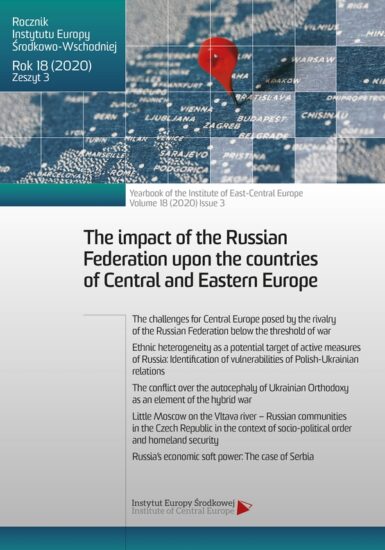Rosyjskie soft power w polityce gospodarczej – przypadek Serbii
ORCID: Sandra Baniak: 0000-0001-5746-949X
Afiliacja: Ministry of Economic Development, Labour and Technology of Poland,
Pages: 93-114
Edition: Lublin 2020
DOI: https://doi.org/10.36874/RIESW.2020.3.5
Citation method: S. Baniak, Russia’s economic soft power: The case of Serbia, „Rocznik Instytutu Europy Środkowo-Wschodniej” 18(2020), z. 3, s. 93-114, DOI: https://doi.org/10.36874/RIESW.2020.3.5.
Keywords:economic diplomacy, economic influence
Abstract: Serbia inherited Yugoslavia’s tendency to pursue its foreign policy in terms of “multi-vector” policy and balancing between the West and the East to achieve its own political goals and maintain the attention of other countries. Despite the desire to join the European Union, as officially declared by the state authorities, Serbia also strives to maintain a “strategic partnership” with Russia. This paper presents Russia’s interests in the policy towards Serbia in the economic sphere over the years, starting from 1999. It points to the complexity of Serbian-Russian economic relations and their relationship with political issues. Russia, as a permanent member of the UN Security Council, can significantly affect Serbia’s internal and foreign policy, making it dependent on guarding Serbia’s sovereignty and territorial integrity and through the lack of recognition of Kosovo’s independence by pursuing its own interests, manifested by an increasing Russian presence in the energy sector.
Bibliography:
Bechev, D., Rival Power: Russia’s Influence in Southeast Europe, New Haven (CT), 2017.
Breban, D., Serbia – Between the hammer and the anvil: anoverview of the security of supply in South-Eastern Europe, Belgrade Centre for Security Policy, 2018, www.bezbednost.org/upload/document/serbia__between_the_hammer_and_the_anvil.pdf.
Bugajski, J., Cold Peace. Russia’s New Imperialism, Westport (CT), 2004.
Curanović, A., Czynnik religijny w polityce zagranicznej Federacji Rosyjskiej, Warszawa, 2010, https://doi.org/10.31338/uw.9788323529293.
Engelbrekt, K., Vassilev, I., ‘European energy policy meets Russian bilateralism. The case of South-Eastern Europe’, in: K. Engelbrekt, B. Nygren, Russia and Europe. Building bridges, digging trenches, Abingdon-on-Thames, 2010, https://doi.org/10.4324/9780203854648-10.
Gvosdev, N.K., Gas, Guns, and Oil: Russia’s “Ruble Diplomacy” in the Balkans, Wilson Center 2011, https://www.wilsoncenter.org/publication/gas-guns-and-oil-russias-ruble-diplomacy-the-balkans.
Headley, J., Russia and the Balkans. Foreign Policy from Yeltsin to Putin, New York, 2008,
Kałan, D., ‘Bałkański przystanek gazociągu SouthStream’, Biuletyn PISM, no. 75 (1187), 2014, https://pism.pl/publikacje/Ba_ka_ski_przystanek_gazoci_gu_South_Stream.
Łoskot-Strachota, A., ‘Ekspansja Gazpromu w UE – kooperacja czy dominacja’, Raport OSW, 2009, https://www.osw.waw.pl/pl/publikacje/raport-osw/2009-10-15/ekspansja-gazpromu-w-ue-kooperacja-czy-dominacja.
LSEE Research on South Eastern Europe & SEESOX South East European Studies at Oxford, London School of Economics, Russia in the Balkans. Conference Report (13 March 2015), http://www.lse.ac.uk/LSEE-Research-on-South-Eastern-Europe/Assets/Documents/Events/Conferences-Symposia-Programmes-and-Agendas/2015-Report-Russia-in-the-Balkans-merged-document.pdf.
Panagiotou, R., ‘The Impact of the Economic Crisis on the Western Balkans and their EU Accession Prospects’, EUI Working Paper, no. 64, 2012.
Petrillo, E.R., ‘Russian foreign policy towards the Balkans: which perspective?’, ISPI Analysis, no. 169, 2013, https://www.ispionline.it/sites/default/files/pubblicazioni/analysis_169_2013.pdf.
Pivovarenko, A., ‘Modern Russia in the Modern Balkans: Soft Power through Investment’, RIAC, 23 May 2014, https://russiancouncil.ru/en/analytics-and-comments/analytics/modern-russia-in-the-modern-balkans-soft-power-through-inves/.
Pronińska, K.M., Bezpieczeństwo energetyczne w stosunkach UE–Rosja. Geopolityka
i ekonomia surowców energetycznych, Warszawa, 2012.
Simić, J., “Ekonomski aspekti strateškog partnerstva Srbije i Rusije”, Centar za evroatlantske studiuje, Novi vek, no. 6, 2014, https://www.ceas-serbia.org/images/2015-i-pre/Novi_vek__br_06-J.Simic.pdf.
Studija Centra za evroatlantskestudije, Širomzatvorenihočiju. Jačanjeruskemekemoći
u Srbiji – ciljevi, instrumenti i efekti, 2016, https://www.ceas-serbia.org/images/publikacije/CEAS_Studija_-_Sirom_zatvorenih_ociju_-_Jacanje_ruske_meke_moci_u_Srbiji.pdf.
Szpala, M., ‘Bałkany po powodzi – konsekwencje polityczne i gospodarcze’, Analizy OSW, 2014, https://www.osw.waw.pl/pl/publikacje/analizy/2014-06-04/balkany-po-powodzi-konsekwencje-polityczne-i-gospodarcze.
Szpala, M., ‘Rosja w Serbii – miękka siła i twarde interesy’, Komentarz OSW, no. 150, 2014, https://www.osw.waw.pl/pl/publikacje/komentarze-osw/2014-10-29/rosja-w-serbii-miekka-sila-i-twarde-interesy.
Szpala, M., Rodkiewicz, W., ‘Putin w Belgradzie – entuzjazm zamiast konkretów’, Analizy OSW, 2019, https://www.osw.waw.pl/pl/publikacje/analizy/2019-01-18/putin-w-belgradzie-entuzjazm-zamiast-konkretow.
The Political Economy of Russian Loans, World View Stratfor, 16 January 2014, https://worldview.stratfor.com/article/political-economy-russian-loans.
Torrabla, R.M., Belgrade at the crossroads: Serbian-Russian relations in light of the Ukraine crisis, Real Instituto ELCANO, no. 64, 2014, http://www.realinstitutoelcano.org/wps/portal/rielcano_en/contenido?WCM_GLOBAL_CONTEXT=/elcano/elcano_in/zonas_in/ari63-2014-montes-belgrade-crossroads-serbian-russian-relations-ukraine-crisis.
Wojnicki, J., ‘Kwestia jugosłowiańska w polityce radzieckiej i rosyjskiej (1945-1999)’,
in: Bałkany Zachodnie w systemie bezpieczeństwa euroatlantyckiego, red. A. Głowacki, S.L. Szczesio, Łódź, 2015.
Yugoslav-American Economic Relations Since World War II, eds. J.R. Lampe, R.O. Prickett, L.S. Adamović, Durham (NC), 1990, https://doi.org/10.2307/20045076.
Keywords:economic diplomacy, economic influence
PDF: Download